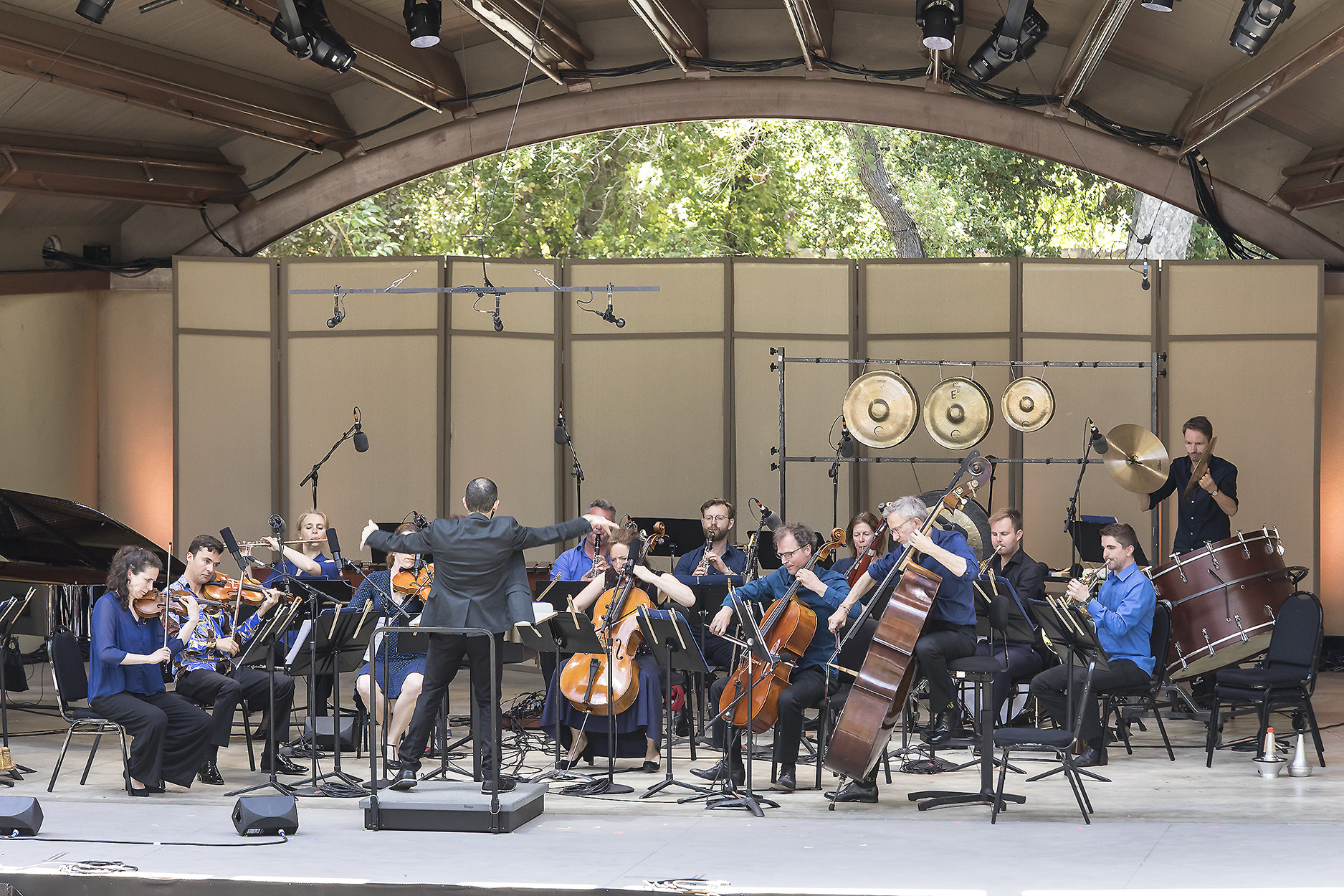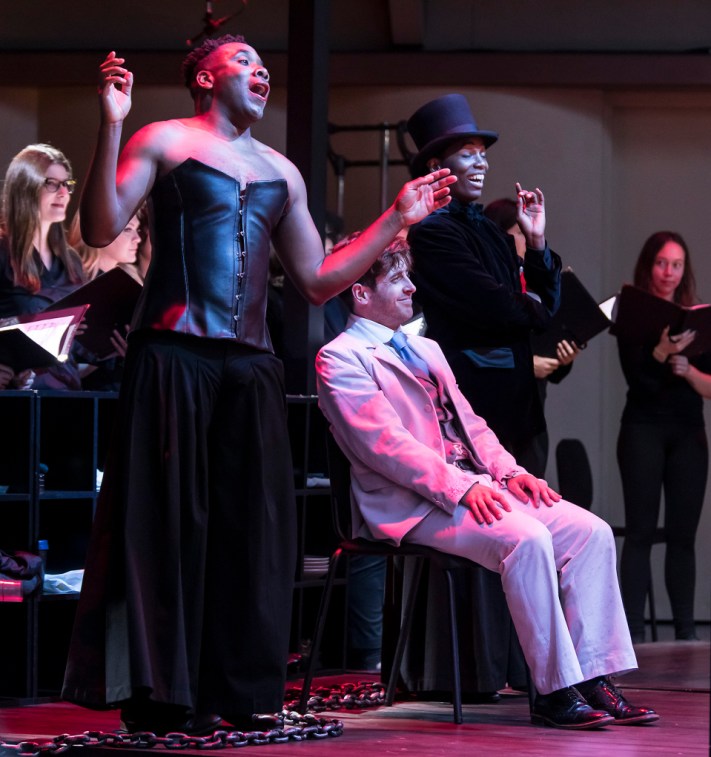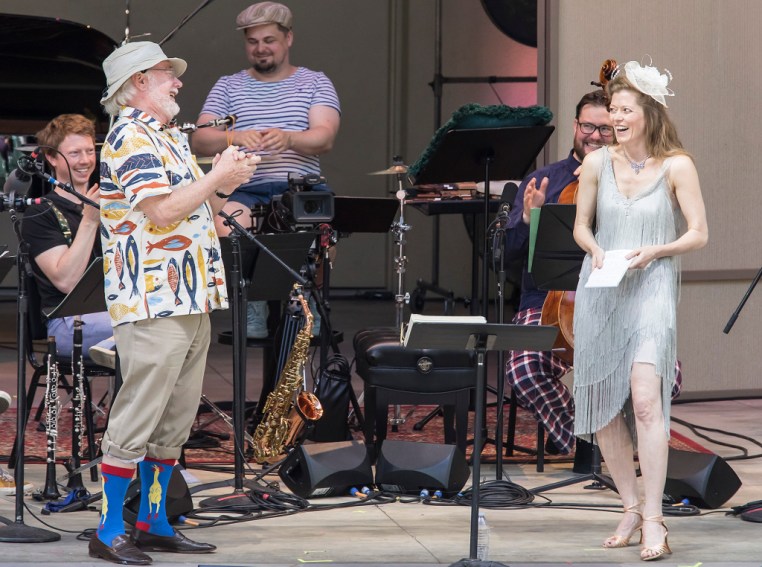Walk on the Wild Side
Hannigan Explores Limits of Composition at Ojai

[Editor’s Note — For the first time since the Independent has been covering the Ojai Music Festival, we have the benefit of two sets of ears, as I am joined in filing this report by my worthy colleague Josef Woodard. Woodard is a dedicated Ojai regular with contents of 38 consecutive festivals stored in his copious biological hard drive. I’ll be writing about the concerts I witnessed in person, and Woodard will be adding details for those and others from his perspective.]
By Charles Donelan:
The festival began in earnest on Thursday evening with Igor Stravinsky’s opera The Rake’s Progress, which was retitled as The Rake Project according to the legend on the large square box in the middle of the stage that comprised the abstract set’s chief element. Festival artistic director Barbara Hannigan emerged before the cast did to anoint the cube with stage fog from a spray can the size of a fire extinguisher. Then, the sides of the cube flapped down, revealing Welsh tenor Elgan llyr Thomas as Tom Rakewell, the protagonist of Stravinsky and W. H. Auden’s looney Faustian riff on William Hogarth’s series of narrative paintings. Soprano Aphrodite Patoulidou gave a magnificent performance as Anne Truelove, a role that launched Hannigan’s operatic career.
I was back at the Libbey Bowl on Saturday for an evening program that combined the sublime and the not-so-successful. Hannigan gave two of the most extraordinary vocal performances ever seen anywhere, and took a breather in between while her vocal proteges in the Equilibrium mentorship program tested the patience of not a few veteran attendees with a medley of folk songs that were judged by some in the audience to be “not very Ojai.”
The first shattering Hannigan appearance of that night was in John Zorn’s “Jumalattaret,” a song cycle based on the Finnish epic Kalevala. From giant, breath-defying held notes to huffing, whooping, and whispering, Hannigan took this story of the creation of the world through praise of multiple goddesses to places only a musical goddess could go.
Later on, after the folk songs had done their presumably palate-cleansing work, she returned with the festival highlight, a wild piece by the spectralist composer Gérard Grisey called Quatre chants pour franchir le seuil. One of the great pleasures and values of the Ojai Festival is how it points the way toward a new canon of great musical works, and in recent years this implied map of the canonical future has been leading us in the direction of Grisey and his fellow spectralists. Using a remarkable array of unusual techniques including a “false interlude” of brushed percussion at the opening of the fourth chant, the piece was a dynamic sonic exploration of the threshold between life and death, and possibly also the end of the world. Drawing on texts that included the epic Gilgamesh and an inventory of the contents of an Egyptian tomb, these songs provided a new way of imagining what music can be.

By Josef Woodard:
For her fascinating if uneven turn as music director of Ojai’s 73rd annual fest, brilliant soprano-conductor Barbara Hannigan opened and closed the program with Stravinsky’s more accessible side. Her brave new semi-staged Rake’s Progress shook the stage on Thursday’s opener, and the ever-comfy neoclassical Pulcinella shared a Sunday finale program with the friendly stuff of Haydn’s “La Passione” symphony, and Gershwin, à la the “Girl Crazy” suite (from Hannigan’s Grammy-nabbing 2017 CD). Hannigan, making complexity look easy, handily juggled her roles as maestra and chanteuse.
Between the Stravinsky bookends came highs and, if not lows, uncomfortable middling moments. Some music felt plainly out of place in this, one of America’s most daring and contemporary-oriented festivals, well-known around internationally. Ill-fitting mainstream items included Rachmaninoff, a bland “world music sampler plate” of songs, and Schoenberg’s mealy mouthed Mahler facsimile “Verklärte Nacht” (sounding meek compared to the program’s spikier, more “Schoenberg-ian” String Quartet No. 2).
On the other hand, and from the “other” end of the spectrum, the festival highlight was the late Saturday night performance of Gérard Grisey’s Quatre chants pour franchir le seuil. Grisey’s “Spectralist” ideas filtered through some of this festival’s finest, and yes, most esoteric moments, as heard in “Lonely Child” by Claude Vivier (whose ritualistic opera Kopernikus was a memorable pinnacle of 2016’s fest), with Hannigan conducting the resident LUDWIG orchestra, and stellar soprano Aphrodite Patoulidou embodying the mystical texts. Early bird 8 a.m. concerts continued this post-spectral thread, with JACK taking on the hypnotic microtonal, textural and time-warping scores of Clara Iannotta, Tyshawn Sorey and Catherine Lamb.

What made the album Crazy Girl Crazy fascinating was Hannigan’s provocative, effective blend of Gershwin, Berg and Berio. But on Sunday evening, arranger Bill Elliott’s “Girl Crazy Suite” capped the fest with just the right American Songbook show biz buzz. Hannigan’s got rhythm, virtuosity, fierce intelligence, a will to entertain, and other bracing virtues. She also has Grisey down.




You must be logged in to post a comment.